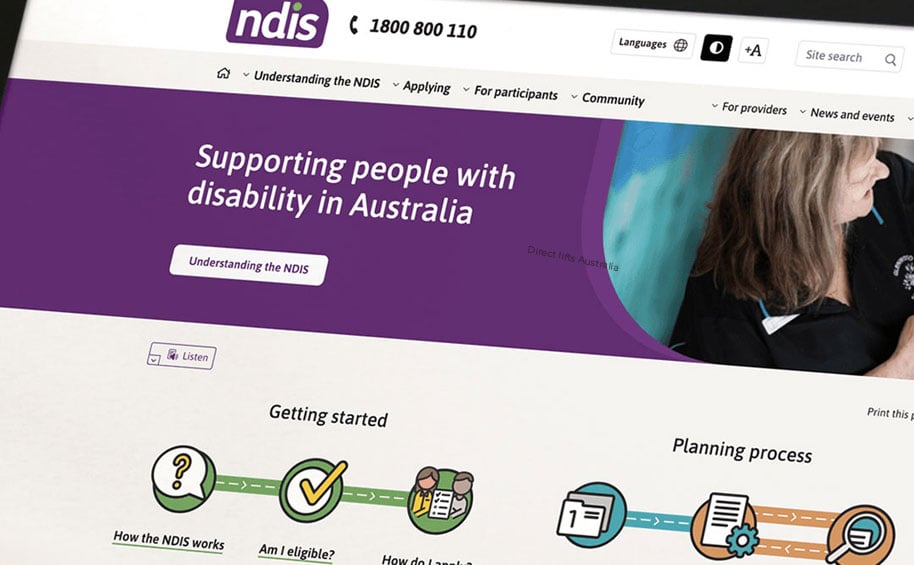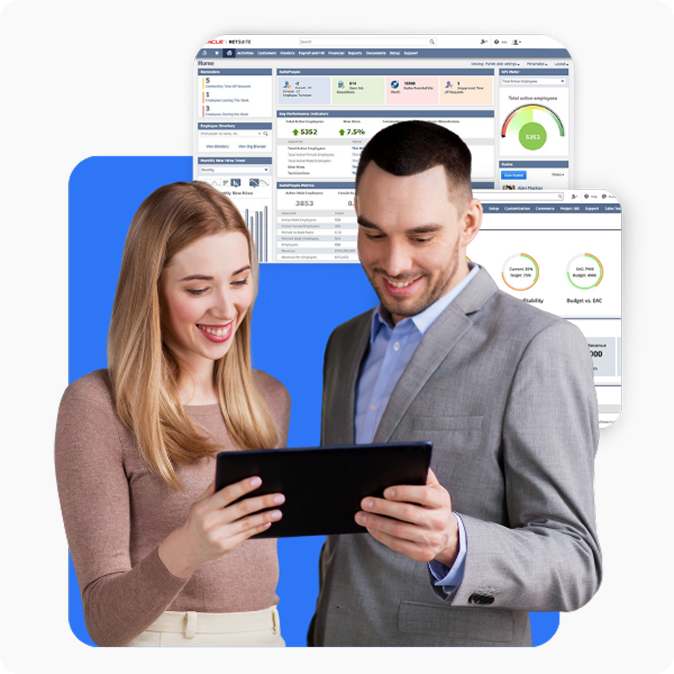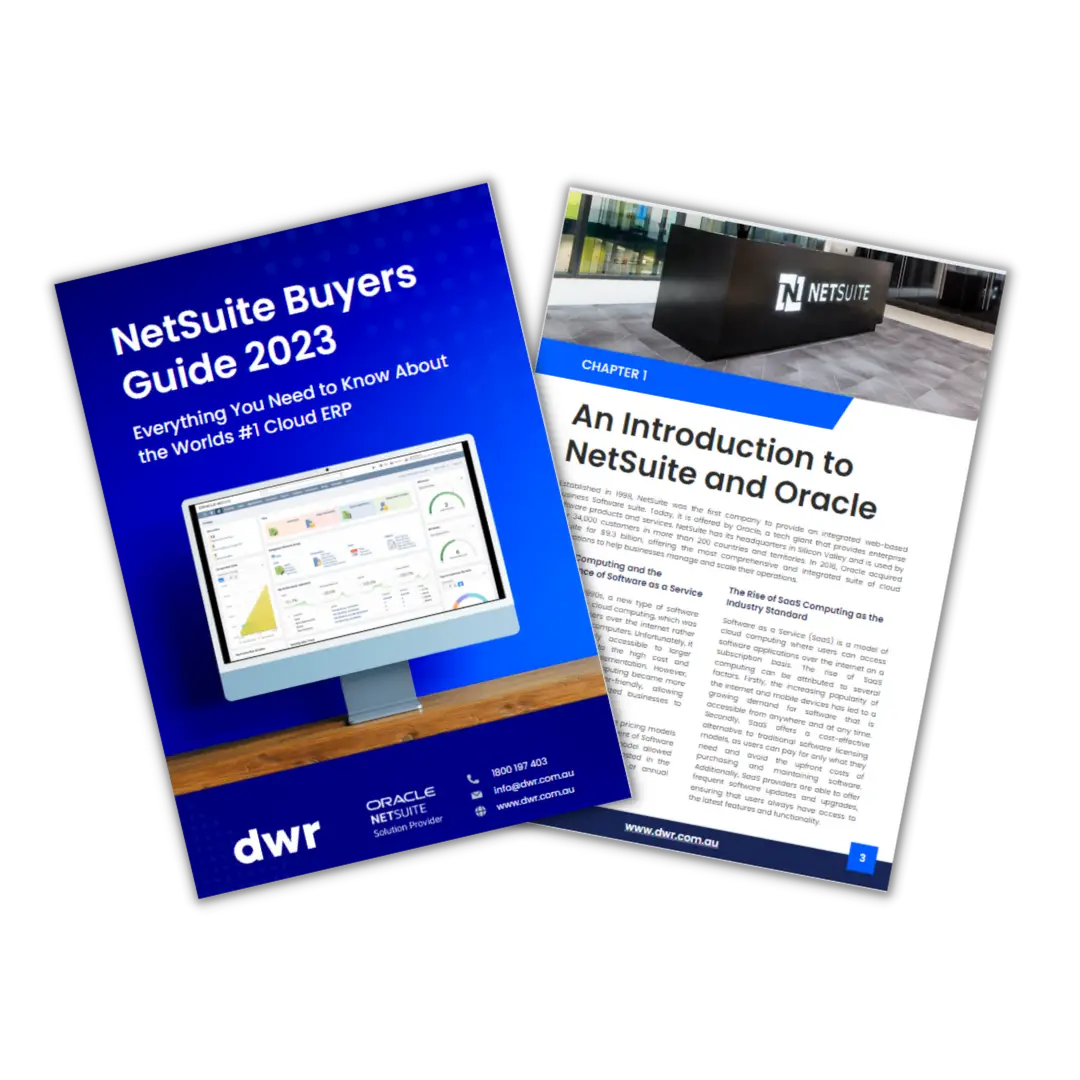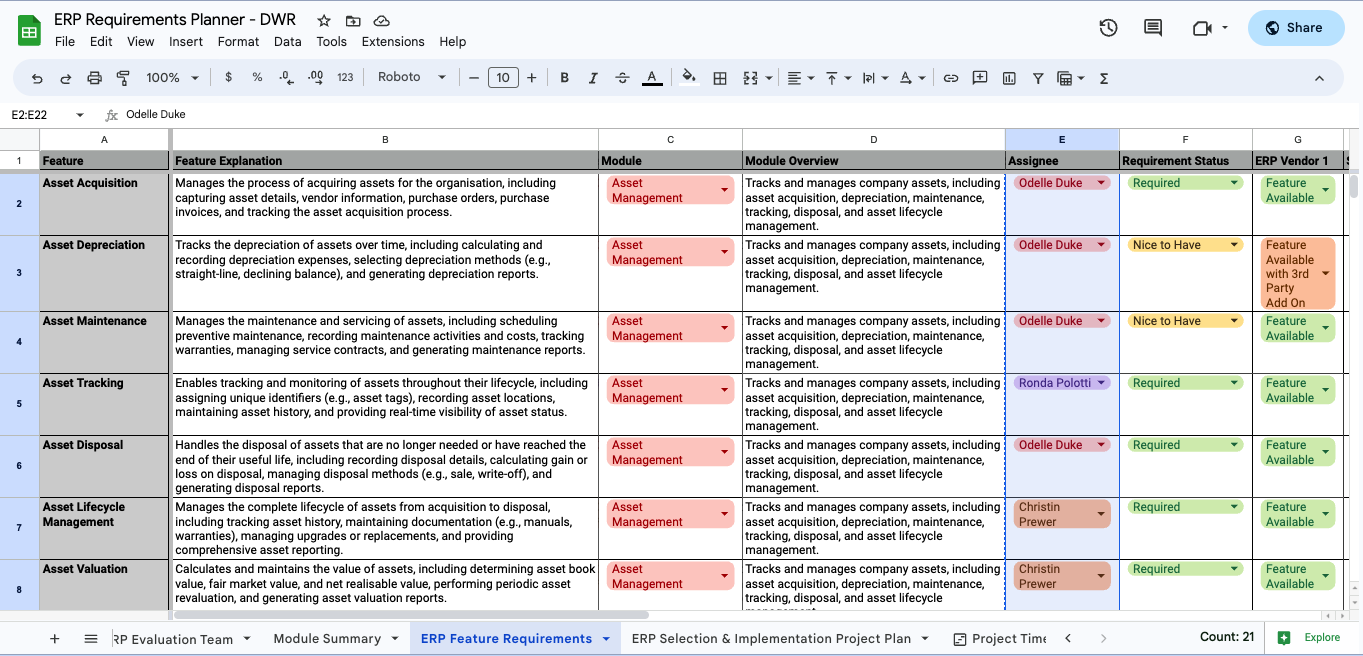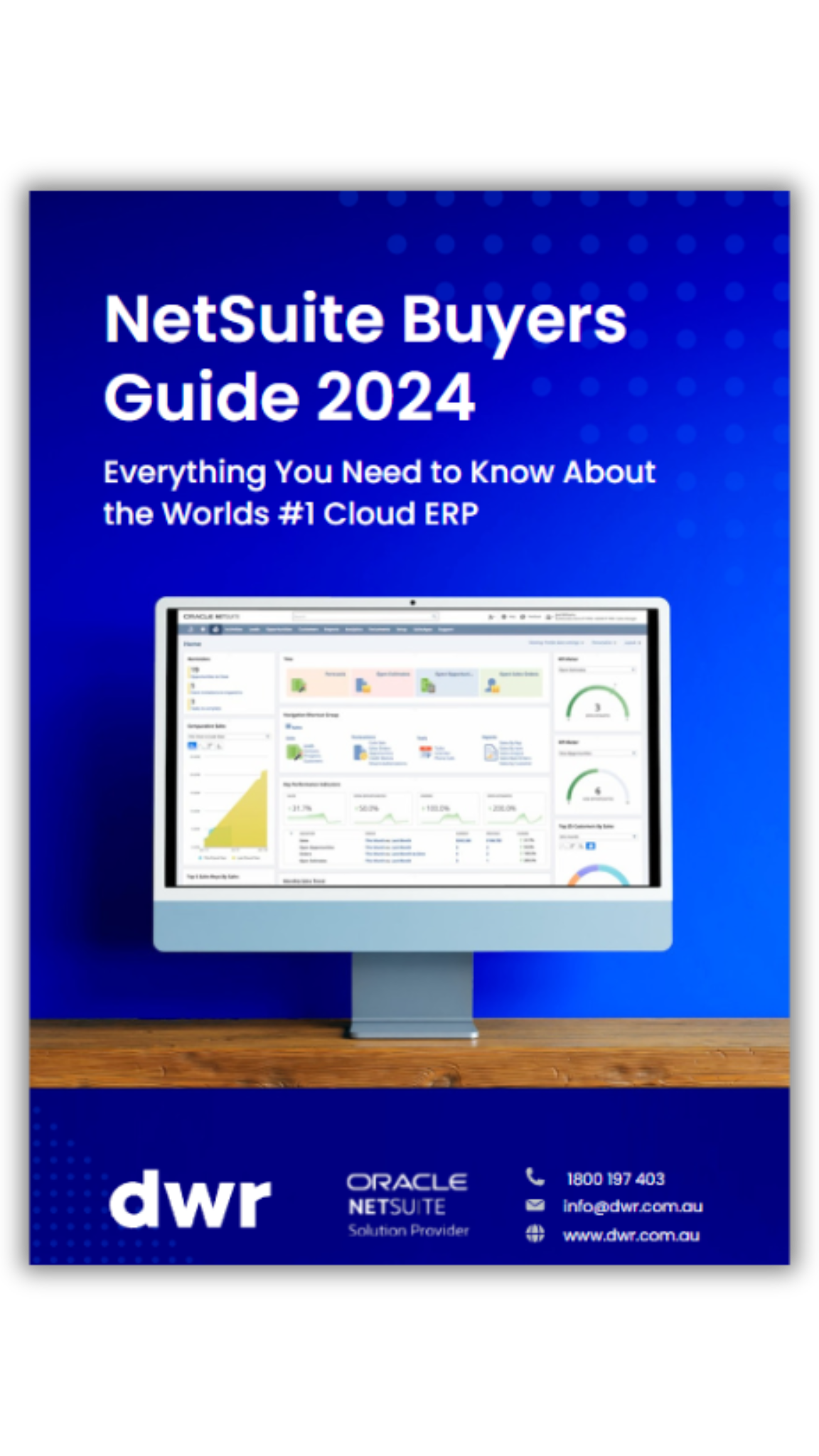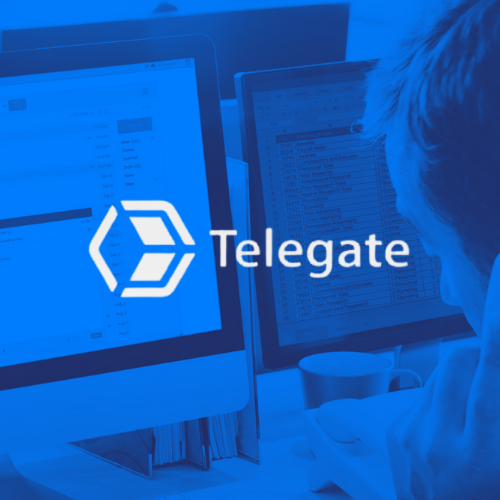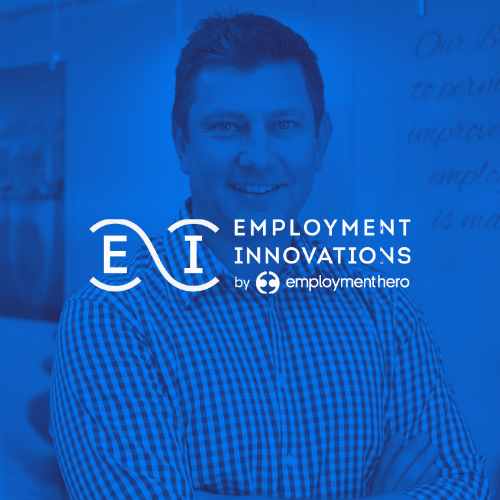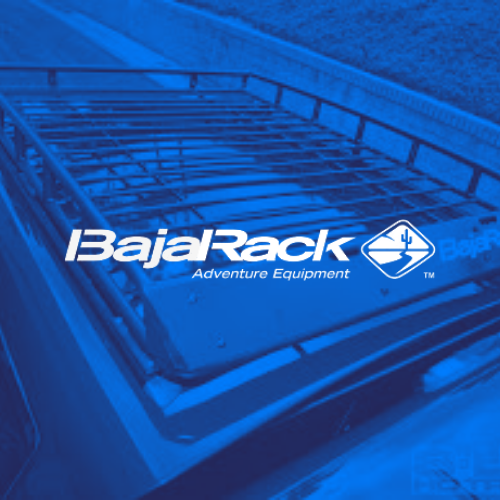Cloud computing has made the cost of software cheaper and more modular. As a result, ERP and Accounting Software are now both jockeying for position among both small enterprise and SMB companies. As Forrest Burnson put it, the cloud has made it "a lot easier for SMBs to treat ERP more like an operating expense, instead of a capital expenditure."
However, knowing which type of platform can benefit your business requires a bit of research. Knowing the difference between Accounting Software and full Enterprise Resource Planning can help smooth an otherwise rocky transition. In this article we take a look at both technology platforms and recommend how, when and why businesses should make the transition from accounting software to a full ERP like NetSuite.
More than just the General Ledger
Prior to the rise of cloud based software and IaaS (Infrastructure as a Service), Accounting Software focused specifically on the General Ledger; debits, credits and financial statements for businesses big and small. They filled a highly specific role, and they filled it well.
Familiar to Small Business in this area are products like MYOB, Quickbooks and more recent companies like Xero. These services provide accurate and essential accounting software targeted at Small Business and lower end SMBs and designed to make the General Ledger easier to track and manage at an affordable price for smaller businesses.
However, as the marketplace has become more crowded and the needs of companies have evolved, the line between what an SMB needs and what is essential to an enterprise-level organisation has also blurred. Accounting Software players broadened their scope to try and include more features. Now, it’s not uncommon to find the following included in Accounting Software platforms:
- Payroll
- Quote generation
- Invoicing and Payments
- Purchase Order generation and reconciliation
- Inventory integration
- ...and more.
Previously, even more, advanced features were associated with ERP platforms.
Why is Accounting Software moving into the ERP space, and is it enough for SMB or Enterprise level organisations to stick with Accounting Software rather than making the switch to a full ERP?
We’ll get to that, but first, let's take a look at how the cloud is changing the way software platforms do business in the eCommerce industry.
How the cloud has changed the way ERP and Accounting Software interact
The move to cloud and hybrid hosted platforms has been a boon for businesses across the board. True Cloud architecture not only makes it easier for newly engineered software platform companies to ensure version control and bug patching happens smoothly and holistically, but also provides efficient and scalable options for their customers; budget-conscious businesses that want to ensure maximum ROI.
This means that an ERP can scale down and offer modular benefits to an SMB, directly competing with Accounting Software and offering several forward-moving benefits that potentially make Accounting Software less valuable.
Integrated architecture
Cloud-hosted software, also called SaaS (Software as a Service) integrates better with other SaaS platforms. With companies beholden to many pieces of software, integration and data synchronisation is essential. To achieve this, cloud-hosted platforms use APIs to communicate better across the network.
At face value the benefits are clear; CRMs can talk easily with Accounting Software, Inventory Management and eCommerce. Apps that don’t integrate quickly find themselves left out of the market, and this pushes software vendors to keep providing excellent integration and top-level software service.
However, with so many different systems communicating through layers of network infrastructure, these new methods present their own risks. It is here that we find the main challenges for both vendors and businesses, and unearth the primary motivations for the crossover in feature sets with ERP and Accounting Software.
Defining Enterprise Resource Planning (ERP) in the cloud
Netsuite defines ERP as “A set of integrated applications that collect, store, manage, and interpret data from all sorts of business activities.”
An ERP’s exact function will depend largely on the type of business, but generally includes such activities as:
- Sales & Marketing
- Manufacturing
- SRP
- Inventory Management
- Shipping and Tracking
- Payment
- Data collection and reporting
- And more.
A fully functioning ERP should cover the business workflow from lead/custom engagement to customer purchase to delivery, including stock management, post sale service and asset, equity and liability management. It serves as a central hub for eCommerce activities.
As an umbrella term, ERP can be seen to include Accounting Software within its purview. Here we come to the crux of the difference between a fully-fledged ERP and accounting software.
Owner operated
Most Accounting Software platforms have SMBs as their target demographic. Owner operated businesses that don’t have the need or resources for a fully-fledged ERP, and instead are focused on tracking financials, tax, debits and credits.
SMB Accounting Software platforms are feature-light ERPs that are simpler to use for small businesses but don't provide the complexity and data fidelity of ERPs. However, with cloud-hosted software, ERPs are beginning to offer their own versions of SMB relatable software.
Workflow security and approval
Accounting software generally has less customisation when it comes to secure access to workflows within the platform. With a focus on SMBs it’s a given that there’s less staff, less staff turnover, and overall less need to protect and secure data within the organisation.
Organisations that scale into the enterprise are generally more concerned with access controls. Cloud-based platforms with web portal access have to be even more careful about who and how access to particular workflows is managed.
In ERP parlance, this is often referred to as Full Access versus Approval Workflows. While modern accounting software does make some efforts towards user control, ERP platforms generally have more granularity of control over their process and workflow management.
Interface interference
A big drawcard for SMB’s and enterprise organisations considering the transition to ERP from a pure accounting platform is the efficiency that comes with a single interface.
While an ERP consists of a single framework and workflows connecting features and processes, some of them may be third party, integration happens at the back end of the platform. Front end-user interaction happens over a single interface. The benefits of this should be clear at an executive level, but let’s list some of them anyway:
- Less staff training
- More efficient workflows
- Better data integration and reporting
- Easier version control and patching.
Accounting software, with its more traditional focus on financial activity, can’t provide that same uniformity of interface. Your accounting software platform might have the capability to integrate with CRM and inventory software, but they are ultimately different pieces of software with different user experiences, GUIs and maintenance schedules. For an SMB where only a small group of staff are interacting with the software on a regular basis, this might not be a problem. For larger SMB or enterprise-level activity, it means considerable waste in man-hours when it comes to staff training and workflow.
Database integrity
The ERP versus Accounting Software debate has many ins and outs, but perhaps the most important to any business heading into the connected future is the integrity of data.
Accounting software isn’t less accurate than ERP by nature. In fact, good accounting software is all about accuracy. But the fact that accounting platforms themselves must share data between third party software to realise maximum benefits for an organisation puts Accounting Software at a distinct disadvantage when it comes to data fidelity.
ERPs are able to manage data loads more accurately than Accounting software. Instead of separate applications sharing, syncing and drawing information from individual databases, the ERP manages a single database to which multiple features, from CRM and inventory to financial, HR and Commission Management access, update and validate.
With the Internet of Things fast becoming a reality, enterprise-level Big Data is going to require high fidelity to be of use to the organisation. While this might be primarily the purview of CTOs and CIOs, all C-Suite execs should consider how their current data collection and validation feeds into their big data analysis. These reasons could be motivating factors for both enterprise and SMBs for switching from Accounting Software to a full-service ERP.
Accounting for change
Earlier, we touched on the propensity for accounting software platforms to introduce new features that take the platform outside of the specifics of the General Ledger. Now that we’ve dived into the functions of ERP, it’s a bit clearer why accounting software is growing outward into aspects of business not traditionally associated with accounting. Let’s examine further:
- No platform wants to be redundant - In many ways, accounting software can be a victim of its own success. MYOB, Xero and friends help SMBs grow into enterprise-level organisations. When they reach enterprise, they now look to ERP to manage business activity across the network. While that doesn’t immediately make accounting software redundant, it does make it beholden to an umbrella platform that could phase the accounting software out through deployment of its own accounting module.
- Platforms need to keep growing - Business needs change and software platforms need to adopt. A business that isn’t growing is at risk. Accounting software platforms are feeling the pressure to innovate to acquire new customers.
- API invasion - While APIs are integral to the interfacing of multiple platforms across the cloud, they also blur the lines between where one piece of software begins and the other ends. Data is power to software, and platforms that don’t innovate could see themselves API’d out of the equation.
Advantages and challenges of moving to ERP
For a small or medium business considering the move from accounting software to an ERP, the challenges can be seen to reflect the larger issues many SMBs face in making the leap to enterprise, a jump in scale that fundamentally changes the business workflow, increases staff, complexity, revenue and risk. A successful ERP implementation is a step towards a successful move from SMB to enterprise, but executives need to consider the following in their business strategy.
ERP Complexity: A blessing or a curse?
Anson Ang, Director at PMC says “At the very core of ERP is the centralization of data across various departments that comes with the integration.”
That centralisation leads to a number of on-paper benefits to ERP:
- Unified database
- Workflow visibility and integration
- Efficiency across departments
- Higher capacity.
But can these benefits be realised without disruption to business as usual?
ERPs are by their nature complex. Even the best implemented ERPs have many working parts and for an SMB making the jump to enterprise resource allocation needs to be strongly considered. Avoid over-complication of smooth business practice by consulting with an ERP strategist to see which features of ERP you need and which might be redundant to your business workflows.
Costs of ERP implementation
With many working parts and responsibilities, ERP costs can be prohibitive to an SMB. Consider the following:
- Ongoing licensing fees
- Costs of hosting
- Potential for incurred costs when scaling
- Maintenance and staffing costs (I.E. IT contractors or staff).
Receiving value for money and return on investment means research into the costs and benefits of different ERP suites. Consulting with an experienced professional for a cost-benefit analysis on ERP and your business.
Advantages of ERP to small and medium business
We’ve looked a lot at the distinction between ERP and Account Software as the delineation between enterprise and SMB, but are there advantages for small and medium businesses in using an ERP instead of, or in concert with, Accounting Software?
It today’s cloud-hosted world, the answer is yes.
In fact, Small Business Computing reports up to 59% of SMB are considering implementing ERPs while not being enterprise-level companies. Advantages cited include:
- All data in one place
- One overarching system
- Less reliance on a combination of databases and platforms
- Streamlined technology
- Improved CRM
However, the same data suggests that ERPs aren’t quite the norm in small businesses. While cloud computing has brought the price of ERPs down to levels scalable to SMBs, two-thirds of SMBs aren’t using an ERP right now.
Which is for me - ERP or accounting software?
Some might say the simple answer to this question is if you are a small business then go with accounting software, and if you are a larger SMB or Enterprise, then go with the one that has word ‘enterprise’ in it (ERP).
However, we already know that’s no longer such an easy distinction. Consider the following questions and how they might apply to your business:
- Does my current platform meet all my current and future needs?
- What steps need to be taken to effectively transition from accounting software to ERP?
- Will I still need my accounting software platform under the new ERP?
The most important element in any technology facing business (which is every business) is the forward strategy. Regardless of whether it’s now or in the future, your company will most likely want to move to an ERP at some point.
To speak with an expert in ERP about how they can benefit your organisation, contact the team at DWR today. They’ll be able to tailor a solution to suit your business needs, resulting in a more scalable future for your organisation.
.svg)



.avif)
















